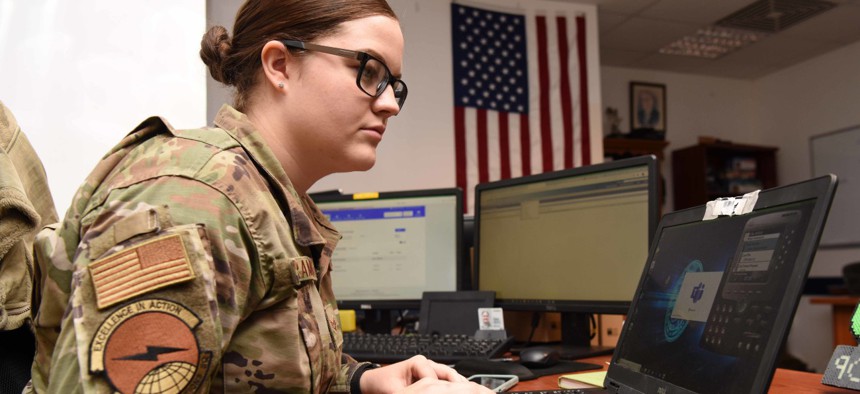
U.S. Air Force Senior Airman Kaitlyn Schramek, 39th Communications Squadron voice systems technician, troubleshoots a voice communicator app at Incirlik Air Base, Turkey. Voice systems technicians ensure voice communications are accessible for telework. Tech. Sgt. Jim Araos / U.S. Air Force
Coronavirus Roundup: Air Force Will Keep Telework Options After the Pandemic; A Bipartisan Call for Mental Health Guidance for Students
There's a lot to keep track of. Here’s today’s list of news updates and stories you may have missed.
The Big Ten college football conference announced on Wednesday that it would resume its season on October 23, reversing its earlier decision to not play this fall. President Trump and some of his top officials have been strong advocates for bringing back college football. ABC News reported on Wednesday night that the White House engaged in a mass pressure campaign and offered to provide the Big Ten with enough coronavirus tests so they can start the season. The conference wound up using a private company. Here are some other recent headlines you might have missed.
Top Air Force officials said on Wednesday that telework options will remain post-pandemic as the work arrangement will save money and increase productivity, Federal News Network reported. “We’ve had an 800% increase in our ability to do this teleworking digital experience,” said Air Force Vice Chief of Staff Gen. Stephen Wilson during a conference. “Nobody wants to go back to what we were doing. So, how do we take this challenge and use it as an opportunity to move us forward?”
Sens. Elizabeth Warren, D-Mass., and Bill Cassidy, R-La., wrote to the Health and Human Services and Education departments on Wednesday to ask that they issue guidance for K-12 schools, colleges and universities on how they should provide mental health services for students, whether they are doing in-person or virtual learning. “Among K-12 students, more than 25% of young people between the ages of 13-19 reported poorer emotional and cognitive health as a result of the pandemic,” they wrote. Also, “the Centers for Disease Control and Prevention recently reported that almost 75% of people aged 18-24 reported at least one adverse mental or behavioral health symptom as a result of the pandemic and 25% had seriously considered suicide in the past thirty days.”
Rep. James Clyburn, D-S.C., chairman of the House Select Subcommittee on the Coronavirus Crisis, demanded the White House coronavirus task force make all of its reports and recommendations to states public. “A leaked September 6, 2020, report, disclosed by ABC News, shows a marked departure from the task force’s previous recommendations,” said a release. This could be “indicating the task force may be weakening its recommendations for states where the virus is still spreading rapidly—including Nebraska, North Dakota, South Dakota—as part of the administration’s efforts to downplay the severity of the virus.”
Dr. David Michaels, former Occupational Safety and Health Administration administrator, co-authored a journal article on Wednesday about how the agency “has not fulfilled its responsibilities” during the pandemic. He argued that issuing an emergency temporary standard is the most vital action the federal government could take and that worker safety needs to be more of a priority for the White House coronavirus task force.
Top HHS Spokesman Michael Caputo is taking a leave of absence after he came under fire for his derogatory remarks about government scientists during a live video on Facebook on Sunday. He tweeted that he will be undergoing screenings for a “lymphatic issue discovered last week” and that he and his family have been receiving “violent threats.” Politico published a deep dive on Caputo’s five-month tenure at the agency, which quotes an HHS official saying Caputo’s pandemic efforts “created a public relations nightmare.”
Dr. Robert Redfield, CDC director, testified during a Senate hearing on Wednesday that a coronavirus vaccine will be “generally available to the American public" in the "late second quarter, third quarter [of] 2021.” He also said that wearing a mask could be more effective than taking a vaccine. During a news conference later in the day, President Trump said Redfield was mistaken and confused on both. “We're ready to go immediately as the vaccine is announced, and it could be announced in October,” Trump said. “It could be announced a little bit after October. But once we go, we're ready.” Dr. Anthony Fauci, director of the National Institute of Allergy and Infectious Diseases, has made comments similar to Redfield’s regarding the timeline.
Earlier this week, the CDC issued new, color-coded guidance to help schools gage their reopenings for in-person learning. “According to at least one early analysis of the CDC guidance, nearly 90% of people in the U.S. live in counties that fall into the two highest risk categories for reopening schools,” U.S. News and World Report reported on Thursday. “The release of the guidance, which recommends aggressive thresholds, reignited a wave of criticism over the lack of federal guidance and left many wondering how many schools would have decided not to reopen for in-person learning if officials had this guidance earlier.”
The Election Assistance Commission is hosting a virtual roundtable on Friday about how states and localities can address voter registration challenges during the pandemic. The agency’s commissioners will moderate the discussion.
Today’s GovExec Daily podcast episode is about the congressional investigations into political interference at the public health agencies.
Help us understand the situation better. Are you a federal employee, contractor or military member with information, concerns, etc. about how your agency is handling the coronavirus? Email us at newstips@govexec.com.







